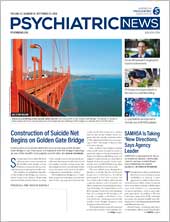Older patients and those with a longer length of stay are more likely to experience an adverse event or medical error during psychiatric hospitalization, according to a study published August 3 in Psychiatric Services in Advance.
Patient safety has become a thriving field of research in the 17 years since the Institute of Medicine report, titled “To Err Is Human,” highlighted the issue of adverse events and medical errors during hospitalization. Yet the authors said that the Psychiatric Services study is one of only a few that have looked at safety exclusively during psychiatric hospitalization
“Patient safety research has guided the development of important interventions to prevent MEs [medical errors] and lower the incidence of AEs [adverse events] in general medical and surgical care,” wrote lead author Jentien Vermeulen, M.D., a professor of psychiatry at the University of Amsterdam and colleagues in the United States. “Knowledge about these critical patient-safety events, however, is notably scarce for mental health care because major studies on the topic have systematically excluded patients receiving psychiatric care in acute care general hospitals.”
Since the IOM report was released, adverse events have been defined as “the negative unintended consequences of clinical care that lead to injury, impairment, or other harm,” according to the study. Medical errors have been defined as “the commission or an omission of clinical care with potentially negative consequences for a patient that would have been judged wrong by skilled and knowledgeable peers at the time it occurred, regardless of whether it caused harm,” according to the report.
Vermeulen and colleagues analyzed a random sample of 4,371 charts from 14 inpatient psychiatric units at acute care rural and urban general hospitals in Pennsylvania. Rates of adverse events and medical errors were calculated overall, then stratified by patient and hospital factors.
The following were categorized as adverse events: self-harm or injury, adverse drug event, assault, sexual contact, patient fall, and “other.” Medical errors included any mention in the chart of medication errors, leaving the hospital without medical consent, possession of contraband, and other nonmedication errors.
Adverse events were identified in 14.5 percent of hospitalizations, and a medical error was identified in 9.0 percent.
Factors associated with a higher risk of adverse events or medical errors were being aged 54 or older, admitted during the weekend, admitted to rural hospitals, or treated at very-high-volume hospitals (more than 1,280 admissions a year). Patients over age 54, who accounted for 23.9 percent of all adverse events, were more than twice as likely to experience an adverse event compared with patients aged 18 to 30 (11.5 percent).
Factors associated with a lower risk of adverse events or medical errors were being aged 31 to 42, having private insurance, and being treated at high-volume hospitals (defined as between 1,061 and 1,280 admissions annually).
Among the 619 adverse events, the most common were classified as “any adverse drug event.” Suicide or suicide attempts appear to be least common among adverse events; a total of 27 adverse events were classified as “any self-harm or injury.”
Regarding the higher risk for very-high-volume hospitals, Vermeulen and colleagues noted that “operating at overcapacity and with higher patient-to-nurse ratios are factors known to be associated with an increase in rates of patient safety events.” In contrast, “smaller hospitals may be under-resourced. ... The optimal equilibrium of staffing and resources to provide safe care may be present in high-volume hospitals.”
The authors wrote that in general medicine, research has established a framework to lower rates of preventable harm in five steps: measurement of events and errors, implementation of evidence-based care practices, investment in implementation, local hospital ownership and peer learning, and alignment of efforts around common goals and measures.
“The field of mental health care would do well to adopt a similar framework,” they wrote. “From our findings, we can then move to the next step and develop evidence-based practices that address the specific vulnerabilities to patient safety in inpatient psychiatry. … These interventions should be targeted to patient groups with the highest risk of experiencing a patient safety event.” ■
“Predictors of Adverse Events and Medical Errors Among Adult Inpatients of Psychiatric Units of Acute Care General Hospitals” can be accessed
here.

